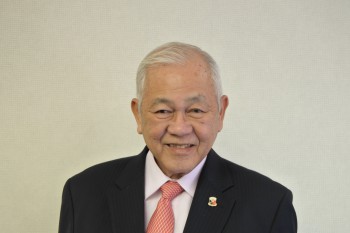Events

May 2019
H. E. Mr. Jose C. Laurel V, Ambassador of the Republic of the Philippines
UPDATE: May 16, 2019
Japan-Philippines Relations: Arrival of Golden Era
— The Laurel family has been serving as Ambassador to Japan for two generations. How do you see the development of the relations between the Philippines and Japan?
The Laurel family has strong connections with Japan. My grandfather was President of the Philippines under the Japanese Military Administration; and my father graduated from the Imperial Japanese Army Academy and served as Ambassador to Japan from 1966 to 71. The relations between the Philippines and Japan were difficult during the war and immediately afterwards. But as Prime Minister Abe has described, the two countries are now in the “golden era” in which we cooperate with each other in various fields including politics, security, economy, and culture. The Filipinos have already forgiven Japan’s past history and are respectful towards the Japanese people. My father focused much of his effort to educational exchanges, and established a number of relevant Philippine-Japan organizations. In the 1970s, the Philippine economy deteriorated during the martial law era under the Marcos administration, and was saved by the consistent financial support from Japan. The recent average annual economic growth has recovered to about 6.5%. There are more than 500,000 Filipino-Japanese children living in both countries. About 280,000 Filipinos who are residing in Japan are mostly hard workers, and they consider Japan their second home. Tourism has increased tremendously, and more than 500,000 Filipinos visited various destinations in Japan last year.
— As Ambassador to Japan, what kind of fields are you focusing to deepen the cooperative relationship between the two countries?
My priority is to stay in the forefront of the effort to make the Philippine-Japan relations closer. I’d like for Japan and the Philippines to work together and develop mutually beneficial relations in which we share common values. My father was acquainted with many Japanese politicians; and through my family, I gained well-balanced understanding of the history and culture of both countries. It was only natural that my business career was exclusively with Japanese corporations such as YKK and Toyota. For more than 45 years, I have been maintaining close relations with Japanese business people based on mutual respect. We are promoting the economic relations as well as cultural exchanges to introduce the Japanese language, bonsai, tea ceremony, etc. to the Philippines.
— The Japanese government is planning to expand acceptance of foreign workers. Do you think that the acceptance situation of Filipino nurses and caregivers has improved?
The Philippines have a large population of young workers who are friendly towards Japan. We are in the better position than any other neighboring countries to help with Japan’s labor shortage. The Philippines also have nursing schools, medical colleges, and maritime schools where students who hope to work in Japan receive skills training. I believe Filipino nurses are better trained in the Japanese language, and their working conditions also have improved. There used to be many Filipino construction workers in the Middle East. But recently, they started moving to Japan where the demand for labor is high due to the Tokyo Olympics. We also see labor shortage and increased wages in Manila because of subway constructions. So now Filipino workers have wider choices of employment opportunities.
— Nearly three years have passed since the Duterte administration was inaugurated. How is the peace and national development program progressing?
Mr. Duterte is the first President from Mindanao. He sought the Laurel family’s support in presidential election. He spent 4 hours talking to our family about his political orientation, and I thought it was similar to my grandfather’s philosophy and decided to support him. He improved the public security in Davao when he was the mayor there, and as President he has achieved good results in eradicating drug problems and corruptions. Since public security has been dramatically improved in Manila, it is now safe to go out at night. The economic growth has increased to 7%. Also, there has been progress in the Mindanao peace process. A referendum has resulted in the creation of the Bangsamoro Transition Authority that gives autonomy to Muslims, and it is followed by a loan assistance from Japan for the road improvement project. The Philippine people are satisfied with the achievements of the Duterte administration. But we are waiting to see the result of the upcoming midterm election in May.
— What are the challenges for the Philippines to utilize the framework of the ASEAN economic community?
ASEAN has achieved significant success in industrial development cooperation. Japan has mutually beneficial relations with ASEAN member countries by providing them with financial and technological assistance and making investments. This has helped the Philippines and Malaysia create smart cities that enjoy low utility costs including electricity, water, and telecommunication. The Philippines are making progress in the development of New Clark City, in which corporations from fellow ASEAN countries and Japan are participating. And the Southeast Asian Games will be held there in December this year. The dialog concerning the territorial dispute in the South China Sea is continuing on a one-on-one basis between China and the Philippines as well as between China and the ASEAN countries. This is compatible with Japan’s concept of “Free and Open Indo-Pacific Strategy”.
(Interview by Shu Tamaru, FEC Counsellor)